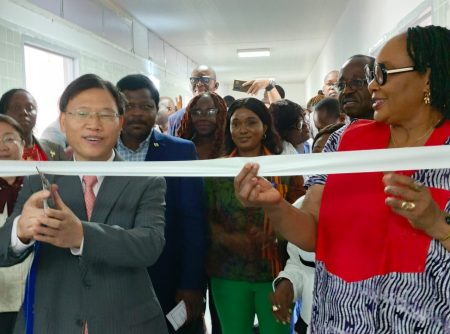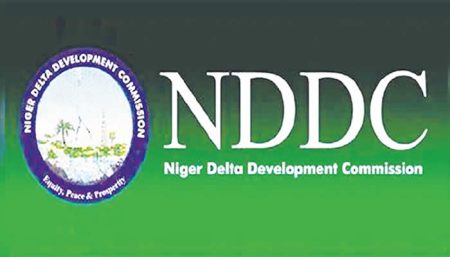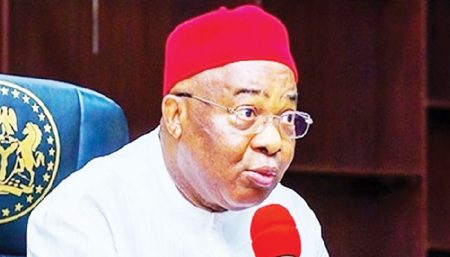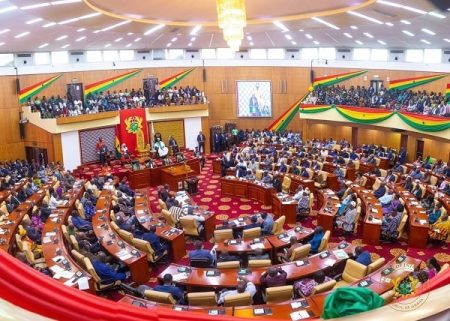The controversy surrounding Ann Sansa Daly’s medical credentials has ignited a public debate and prompted a formal investigation into her qualifications and public pronouncements. Daly, a host of health-related programmes on GHOne TV, has faced increasing scrutiny over her purported medical expertise, leading to questions about her legitimacy to offer medical advice on a public platform. This scrutiny culminated in the government’s revocation of her appointment to the board of the National Health Insurance Authority (NHIA), a significant development that underscores the seriousness of the allegations. The Minority caucus in Parliament has taken a proactive stance, petitioning the Ghana Medical and Dental Council (GMDC) to address the growing concerns and provide clarity on Daly’s professional standing.
The Minority’s petition represents a crucial step in ascertaining the truth behind Daly’s claims and protecting the public from potential misinformation. Their formal request to the GMDC seeks to verify Daly’s registration status and determine whether she is legally permitted to hold herself out as a medical doctor in Ghana. The petition poses two key questions: first, whether Daly has ever been registered with the GMDC, either temporarily or permanently; and second, whether it is permissible under GMDC regulations for an unregistered individual to publicly present themselves as a medical doctor or offer medical advice in Ghana. These questions aim to establish the legality of Daly’s actions and determine whether she has misrepresented her professional qualifications to the Ghanaian public. The petition effectively puts the onus on the GMDC to investigate the matter thoroughly and provide a definitive answer to these critical questions.
Beyond seeking clarification from the GMDC, the Minority caucus has also requested information regarding Daly’s registration status with the relevant medical licensing authority in the United States, where she claims to have obtained her medical qualifications. This request aims to verify the authenticity of Daly’s claims about her foreign qualifications and establish whether she holds a valid medical license in any jurisdiction. The Minority’s comprehensive approach demonstrates their commitment to uncovering the full truth about Daly’s credentials and ensuring that individuals offering medical advice in Ghana meet the required professional standards. The demand for information from both Ghanaian and US authorities underscores the gravity of the situation and the potential consequences for public health if unqualified individuals are allowed to disseminate medical information.
The one-week deadline imposed by the Minority caucus further emphasizes the urgency of the matter. This tight timeframe reflects the public interest in a swift resolution and the potential harm that could arise from prolonged uncertainty about Daly’s qualifications. The caucus’s insistence on a prompt response demonstrates their commitment to protecting the public and holding individuals accountable for their professional representations. The imposed deadline also underscores the importance of transparency and accountability in the healthcare sector, particularly when it comes to the qualifications and credentials of individuals offering medical advice.
The Minority caucus has framed their request as a matter of public interest, highlighting the critical need to ensure that all individuals providing health-related services or advice in Ghana adhere to the necessary legal and professional standards. This framing underscores the potential risks associated with unqualified individuals dispensing medical information and the importance of safeguarding public health by upholding rigorous professional standards. The petition serves as a reminder of the vital role regulatory bodies like the GMDC play in protecting the public from potential harm and ensuring the integrity of the healthcare profession.
The controversy surrounding Ann Sansa Daly’s credentials highlights the larger issue of misinformation and the importance of verifying the qualifications of individuals offering medical advice. In an era of readily accessible information, particularly through social media and television platforms, the public is increasingly exposed to a wide range of health-related content. Therefore, it is essential that regulatory bodies and media outlets take proactive steps to ensure the accuracy and credibility of the information being disseminated. This incident serves as a cautionary tale, emphasizing the need for due diligence and public scrutiny to maintain public trust in the healthcare sector and protect individuals from potentially harmful misinformation. The outcome of the GMDC investigation will be crucial in determining the appropriate course of action and setting a precedent for future cases involving potentially misleading claims of medical expertise.














